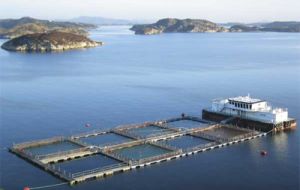MercoPress. South Atlantic News Agency
Chile debates how to avoid repeat of the deadly ISA that devastated the salmon industry
 Salmon farming was one of the booming industries of Chile until ISA appeared
Salmon farming was one of the booming industries of Chile until ISA appeared Fear of yet another outbreak of Infectious Salmon Anaemia (ISA) — an infectious viral disease found in Atlantic salmon — has sparked new debate in Chile’s salmon industry about what kind of regulatory safeguards are most needed.
The illness, which is deadly to salmon and similarly to influenza spreads quickly and easily, was first discovered in 1984 on fish farms in Norway. It has since been detected around the world and the consequences, both environmentally and economically, are substantial.
In Chile, combating ISA is not a new issue. Between 2007 and 2009 ISA infections killed millions of salmon and brought the salmon industry to its knees – until special legislation was passed to help the salmon farmers get access to bank credit.
Following the outbreak, biologists and environmentalists around the world criticized Chile’s salmon industry, especially Salmon Chile (the industry’s lobby group) and the National Fishing Service (the government agency that regulates the salmon industry) for breeding fish in crowded underwater pens that contributed to the rapid spread of the ISA disease.
Since then companies like Australis Foods, among others, have advocated for more stringent health and safety standards.
What this regulatory restructuring should look like, however, remains disputed.
Some supporters of reform suggest that to avoid spreading of the disease smolts —young salmon — should be produced away from other fish in separate land-based enclosures. Doing so, however, carries heavy costs. (Smolts heretofore have been raised mostly in fresh-water lakes.)
According to Chile’s Undersecretary of Fishing, a government agency responsible for overseeing the fishing industry, building these new enclosures would cost an estimated US$6 million each. Prohibiting the breeding of young fish in other enclosures, in turn, would result in the closure of an estimated 56 current underwater pens. The total cost of restructuring the smolt pens is estimated at US$336 million.
Because of these high costs, salmon businesses like AquaChile propose in addition to breeding smolts in land-based tanks, underwater pens in Chile’s rivers, lakes and estuaries should also be allowed. Construction of these structures, Subpesca estimates, would cost the industry far less, between US$1.6 and US$3.7 million.
To address the issue the Chilean government has created a new committee of fishing experts and organized panels for top industry officials to add their input.
By Adeline Bash – The Santiago Times




Top Comments
Disclaimer & comment rulesCommenting for this story is now closed.
If you have a Facebook account, become a fan and comment on our Facebook Page!